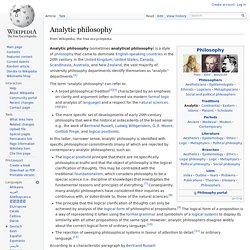

Philosophy. Philosophy is the study of general and fundamental problems, such as those connected with reality, existence, knowledge, values, reason, mind, and language.[1][2] Philosophy is distinguished from other ways of addressing such problems by its critical, generally systematic approach and its reliance on rational argument.[3] In more casual speech, by extension, "philosophy" can refer to "the most basic beliefs, concepts, and attitudes of an individual or group".[4] The word "philosophy" comes from the Ancient Greek φιλοσοφία (philosophia), which literally means "love of wisdom".[5][6][7] The introduction of the terms "philosopher" and "philosophy" has been ascribed to the Greek thinker Pythagoras.[8] Areas of inquiry Philosophy is divided into many sub-fields.

These include epistemology, logic, metaphysics, ethics, and aesthetics.[9][10] Some of the major areas of study are considered individually below. Epistemology Rationalism is the emphasis on reasoning as a source of knowledge. Analytic philosophy. Analytic philosophy (sometimes analytical philosophy) is a style of philosophy that came to dominate English-speaking countries in the 20th century.

In the United Kingdom, United States, Canada, Scandinavia, Australia, and New Zealand, the vast majority of university philosophy departments identify themselves as "analytic" departments.[1] The term "analytic philosophy" can refer to: A broad philosophical tradition[2][3] characterized by an emphasis on clarity and argument (often achieved via modern formal logic and analysis of language) and a respect for the natural sciences.[4][5][6]The more specific set of developments of early 20th-century philosophy that were the historical antecedents of the broad sense: e.g., the work of Bertrand Russell, Ludwig Wittgenstein, G. E.
Moore, Gottlob Frege, and logical positivists. The logical positivist principle that there are no specifically philosophical truths and that the object of philosophy is the logical clarification of thoughts. History[edit] Metaphysics. Metaphysics is a traditional branch of philosophy concerned with explaining the fundamental nature of being and the world that encompasses it,[1] although the term is not easily defined.[2] Traditionally, metaphysics attempts to answer two basic questions in the broadest possible terms:[3] Ultimately, what is there?

What is it like? Prior to the modern history of science, scientific questions were addressed as a part of metaphysics known as natural philosophy. Originally, the term "science" (Latin scientia) simply meant "knowledge". The scientific method, however, transformed natural philosophy into an empirical activity deriving from experiment unlike the rest of philosophy. Etymology[edit] However, once the name was given, the commentators sought to find intrinsic reasons for its appropriateness. Logic. Phenomenology.
History of Philosophy. Philosophy literature. Ontology: being. Philosophy and death. Philosophy and Psychology. Philosophy and Science. Philosophy and religion. Philosophers. Schools of thought. .bodycard 1609.